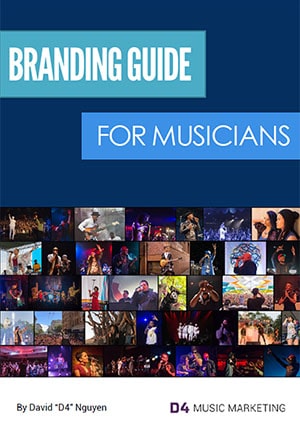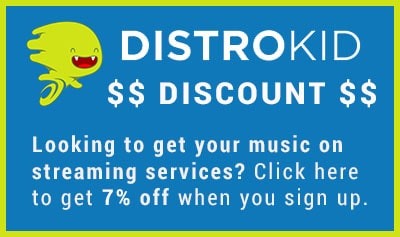
Many developing artists dream of turning their music hobby into a full-time professional career. The problem is that this transition is challenging. Not only do you have to make generate enough income to take the leap, you need to be able to keep it going for the long haul in an ever-changing, competitive industry. Until you get to that point, you’ll need to fund your music aspirations with other sources of income.
This doesn’t only apply to new artists. It’s not uncommon for professional musicians to bounce back and forth between doing music full-time and taking up another job to supplement income. Or, even returning to a full-time day job and doing music on the side. It shows how volatile music can be for independents and why you can’t always depend on income directly from music itself, unfortunately.
As an emerging independent artist, you might be wondering what are your best job options to earn money to fund your music career. In this blog, I will cover 13 jobs you may want to consider while you develop as an artist.
What To Look For In A Day Job or Side Gig
In an ideal situation, you would be working a high-paying job in a field you enjoy that requires less of your time and is very flexible with your schedule, especially if you’re a performing musician. But of course, this sounds more like a fantasy than something you’ll likely encounter.
Generally, one of the key things you want from a job as an artist is scheduling flexibility. High pay is great too, but that usually entails a lot of your time and is high stress.
Secondly, the ideal jobs for artists are related to music in some way. Not only is it good for experience in a facet of the music industry, but it also opens up the potential to network and meet other artists or make industry connections. Not to mention, you might get access to services or resources to help advance your career.
Take into account your background, education, skills and strengths to see which jobs discussed below might more sense to you.
Many aspiring full-time musicians will work a day job, completely unrelated to art or music, make music in their free time and perform gigs at night. Absolutely nothing wrong with that.
Money Does Not Validate Your Artistry
Before getting into what these jobs are, I feel it’s important to emphasize this specific message.
Many musicians want the ability to make a living solely off music because they feel it legitimizes or socially validates them as “real” artists. I want to make it very clear that just because you have a day job or work side gigs to fund your music does not make you any less of an artist.
There are plenty of active independent artists who have built a strong following and released amazing albums, but still work day jobs. At the very least, it would be smart to have fallback options with the volatility of the music business.
You should never let this idea that if you’re not a full-time musician making a living solely from music, you’re not good enough as an artist.
Whether you’re just starting out or you’ve grown a large fan base, there is no shame in having other income sources unrelated to music. It does NOT make you a lesser artist or musician making money in other ways not directly related to music.
If music is something you’re passionate about and you want to pursue it, don’t worry about what others think. Humility is a strength.
1. Merch Seller
Selling merch for other artists during their shows can be a great way to earn cash and get useful experience for your career. Taking on a gig like this challenges you to be organized, pay attention to details and be on top of your game in terms of customer service and presentation. You also see what works or sells well and what doesn’t.
Start by checking in with your network to see if you have musician friends who perform regularly and need help. If any artists or bands you follow have a show coming up in your area, reach out on socials or email to see if they have someone selling merch for them. Some venues may also have merch sellers on a call in case an artist doesn’t have their own seller so network with venues as well.
2. Record Store Worker
Working at your local record shop can be a fun way to surround yourself with music and interact with other music fans regularly. This should be a good way for you to know what’s trending in music and give you insight into the consumer side of the industry.
The downside is the amount of record stores has dwindled in the past couple of decades so opportunities might be more scarce. At least, the latest trends have shown that the demand for vinyl and CDs is still going strong in the streaming era so they’ll stick around for the long term.
To see if your local record shop has any job openings, stop in to ask or check their website. They may have signs posted looking for help. There’s a very good chance they have social media accounts so be sure to follow them If there are any openings, they may post about it like this record shop did in my area.
3. Music Venue Worker
Working at a venue where shows are being held regularly is a good way to have a foot in a key revenue-generating sector of the music business. Depending on your skills and experience, there are a lot of different roles that may be for you, like a bartender, ticketer, front-of-house (FOH) engineer, marketing, talent buyer and security guard.
Unfortunately, the COVID-19 pandemic led to many closures of smaller independent music venues around the world. However, the demand for live music has bounced back since the days of lockdown and is at an all-time high.
Finding opportunities at a venue can be as simple as walking in to ask or check the venue’s website. Also, find out what websites the venue uses to list job listings by Googling the venue name, city and “job listings” in one query.
4. Event Promoter
In another sector of live music, you have event promoters. An event promoter is someone who organizes, manages and promotes live shows. They can also act as a talent buyer to book artists for different shows, concert series or festivals they are throwing.
Some venues will have their own in-house event promotion team, but many will work closely with event promotion companies, where you’ll likely want to get started to get experience.
As an emerging artist, there’s a lot of value in working in this sector of live music from networking connections, industry insights, and marketing experience that you can apply to your own career. You may even get opportunities to perform.
The most practical way to get started is to find job openings at event promotion companies in your city or local area. To do this, look up upcoming shows at venues in your area and see who is throwing the event. For example, I can check the website of my local venue Harlow’s here in Sacramento and see who is hosting each show on the events page. The two event promotion companies I see there are Sean Healy Presents and (((FolkYeah!))).
5. Screen Printing Shop Worker
Merchandise is such an important income stream for musicians who want to make a living off music sustainably. Working at a shop that produces merch can be very useful in learning the printing process, what blanks are the best and new design ideas. Maybe you’ll even get discounts for your own merch, allowing you to have better profit margins.
Doing a quick Google search for “screen printing shops” should be able to yield some local spots in your city. Reach out to see if they have openings or keep on the lookout for job listing sites.
6. Record Label Employee
What better way to learn the music business than through a record label. There are different types of labels from local indie ones to the big 3 major labels (Universal, Sony and Warner) and their subsidiaries. Although they don’t just focus primarily on physical records like in the pre-internet days, they still encompass many aspects of releasing, distributing, publishing and marketing music releases.
Just be aware that the more established record labels may require college degrees in the relevant field you’re applying for.
To find a job at a record label, check on their website or social media accounts, including platforms like LinkedIn, to see if there are any job openings available. You can also do a Google search of the company name and add “job listings” to see which websites they often use to list jobs.
7. Photographer / Videographer
Content creation for musicians is more important than ever. Being able to capture photos and videos could be a fun way to earn money from other artists. In my experience, it’s quite common to see musicians who also do photography and/or videography.
After all, these skills in capturing visual art can be useful for your own needs. Or at the very least, it’ll allow you to communicate what you’re looking for from other photographers and videographers you may hire.
You can pick up an entry-level camera, maybe a used one, and start off as a hobby. Not ready for that type of investment? Use your smartphone. Generally, you can still get really good photos and videos with it.
To get started, offer to do free work for artists in your network.
8. Online Marketer
Online marketing is always a big area that artists need help with. There’s a wealth of information in the form of blogs, videos and courses that teach this stuff. If this is something you’ve been able to master, why not offer your services to handle certain areas for others?
Whether it’s managing social media accounts, growing an email list or running ads, there’s always going to be a demand. The best way to start is by working with those in your network who may need help in this area.
9. Graphic Designer / Web Designer
Just like with photos and video, there’s a need for creating graphics, whether it’s for social media, branding, logo, album art or a website. This area is a bit tricky since you have services like Canva and AI that are free or inexpensive alternatives artists can use to handle their graphic needs.
But, if you’re highly trained or skilled in this area, there’s going to be an opportunity. Plus, not everyone has the time to do things themselves. Others prefer to work with another person rather than depend on technology to create it.
You can start by offering your services to other artists in your network. There are also freelance marketplaces like Fiverr or UpWork to sign up for.
10. Tour Manager
A big part of the music business is live music. A tour manager works with artists to handle all the logistics, travel, coordination and budgeting involved with doing shows and tours. This way the artist can focus on their performance and not be boggled down by the business side of the show. Similarly to working at a venue or with an event promoter, it’s great insight and experience in the live music sector.
If you’re completely new to this area, see if you have any artist friends in your network who regularly perform shows and offer to do it for free to get experience.
You can also have an in by helping artists sell merch or taking photos at shows. A musician friend I know got his start because he was regularly taking photos and videos at shows for an established Hip Hop group. They eventually trained and paid him to be their tour manager.
11. Music Teacher
Teaching on the side is a common path for musicians. This can be done with private lessons in person, teaching an online course or as a part of a local music school. Of course, it will depend on your level of proficiency, education level and how comfortable you are with teaching.
You can find gigs on Craigslist or your local community. There may be someone in your network with kids who want to learn to play an instrument. I have seen some musicians announce that they are offering lessons on social media as well.
12. Anything related to other passions or interests
If finding a job related to music is tough, think about other areas of interest you have and see what jobs could be available. At the very least, it beats working a soulless fast food or office job you’ll hate.
For example, you may enjoy plants and gardening as a hobby. See if your local plant stores have job openings.
Maybe you love animals and consider yourself an animal rights activist, see if pet shelters have jobs or volunteer work available.
Even doing volunteer work on the side could potentially lead to paid opportunities in the future. I’ve experienced this firsthand.
I know we mostly live in a capitalistic world, but life shouldn’t be all about money. Look for other passions of yours that fulfill you and see that can be your stepping stone for music.
13. Lyft / Uber / Doordash
One of the most flexible gigs you can do unrelated to music is driving people around or delivering food. It pays close to the minimum wage as an independent contractor, but the ability to start anytime can be very useful.
To be honest, doing gigs through food delivery apps is what I started with and I still do to this day. I’ve been fortunate enough to make a decent living working with artists alone but I still do DoorDash to make a little extra income.
Because I can start and finish whenever I want, it’s the ultimate flexible gig. I used it as an opportunity to listen to podcasts while driving and learn new things in between deliveries.
Conclusion
Some may be wondering why I am covering ideal jobs for emerging artists. What does this have to do with music marketing?
The fact is marketing and music promotion costs money. You’d be surprised how many artists out there refuse to pay money to market and promote their music, but complain their music isn’t getting heard.
The funding of your art has to start with you. If you haven’t built enough leverage (i.e. large social media following, consistent hit songs, viral success) to get a record label to invest in you, it is solely up to you to fund the marketing and your development to get to that point.
Not making enough money from your music earlier on isn’t an excuse for why you can’t invest in marketing your music. If you can’t fund your business/career directly from your music yet, then you need to do it with a more stable income source. Again, nothing wrong with a day job or a side hustle.
If you’re having fun and believe in your music, keep going. Do not worry about what others think if you’re not making a living off music alone. As long as you’re making music for the right reasons (i.e. not to become rich and famous), you’ll always be an artist regardless of how you fund it.







